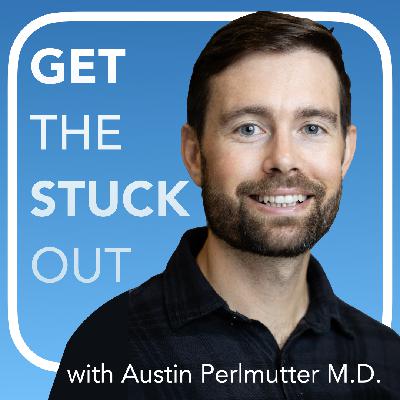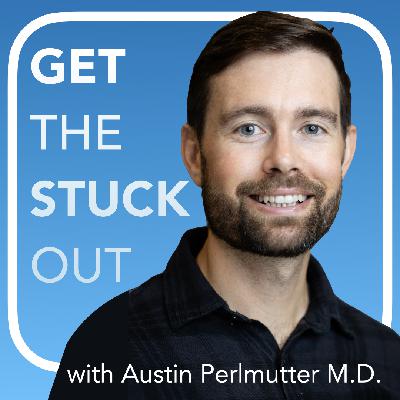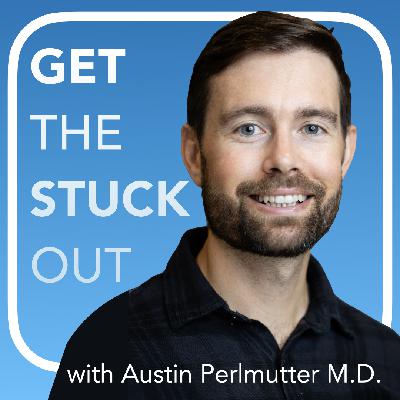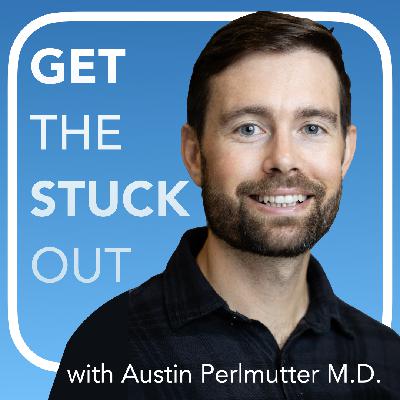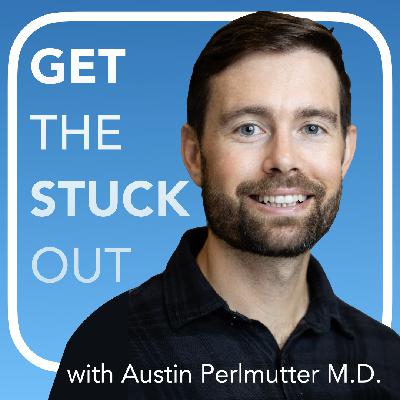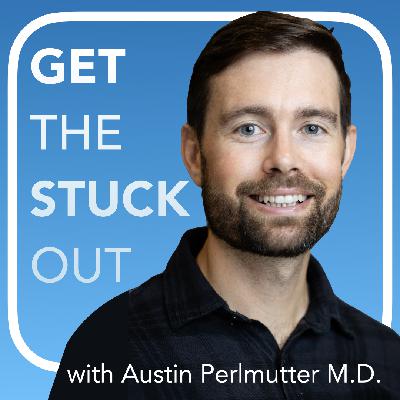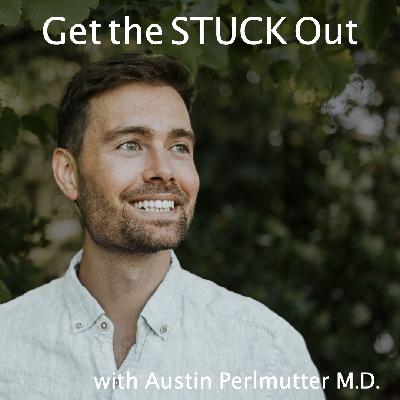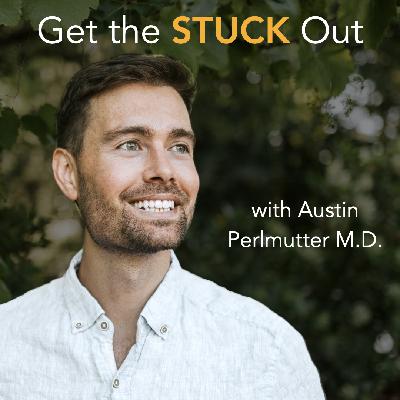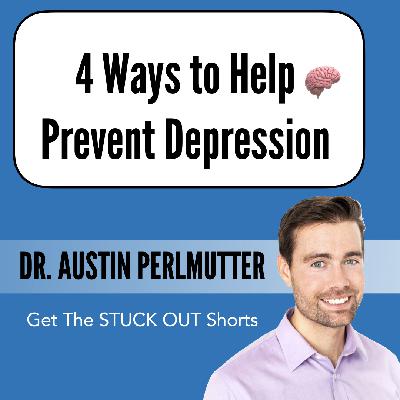Discover Get the STUCK Out
Get the STUCK Out

Get the STUCK Out
Author: Austin Perlmutter, MD
Subscribed: 35Played: 336Subscribe
Share
© Copyright Austin Perlmutter, LLC 2020
Description
This podcast is about how to improve your brain health today and tomorrow using neuroscience, diet, lifestyle medicine and more. Topics include food, exercise, sleep, nature, modern medicine, psychedelics. I interview key experts and take you on deep dives into the latest research.
33 Episodes
Reverse
6 Daily Habits to Help Prevent Dementia & Keep Your Brain Sharp | Dr. Austin Perlmutter Dementia and Alzheimer's disease are on the rise — but science shows your daily habits can significantly lower your risk. In this video, physician and brain health expert Dr. Austin Perlmutter shares 6 science-backed strategies to help prevent dementia, protect memory, and keep your brain sharp at any age. These habits address the most important lifestyle factors for brain health: movement, sleep, social connection, diet, stress, and clean air. You'll learn why they matter, the research behind them, and how to make them part of your daily routine. This podcast is sponsored by Lichen Air. I helped start Lichen Air because air pollution is a top threat to brain health. We build science-backed air purifiers with advanced HEPA-14 filters and large-room capacity for brain wellness. Our industry-leading, third-party tested indoor air purifier removes up to 99.995% of particles of 0.3 microns or smaller (that includes bacteria, mold, pollen, smoke and much more). You can get an exclusive $100 off the air purifier when you go to www.lichenair.com and use code "Cleanair100". Again, that's www.lichenair.com. Check out my newsletter! https://www.austinperlmutter.com/newsletter In this video: -Introduction: Why dementia prevention matters -Move your body: Exercise & brain function -Sleep for brain detox & memory consolidation -Social connection: Loneliness & dementia risk -Eat real food: diet & cognitive protection -Manage stress: Mindfulness & neuroprotection -Clean air: Pollution, brain inflammation & dementia This content is not intended to diagnose, treat, cure, or prevent disease. The information provided by this video should not be used as individual medical advice. You should always consult your healthcare provider for individual recommendations and treatment.
The New Science of Psychedelics for Brain Health 🧠✨ For thousands of years, humans have turned to psychedelic plants and fungi—from psilocybin mushrooms to peyote cactus—for healing, ritual, and transformation. But now, cutting-edge neuroscience is uncovering how these substances may do more than alter consciousness—they may rewire the brain and reduce inflammation in ways that could benefit mental health, cognition, and even longevity. This podcast is sponsored by Lichen Air. I helped start Lichen Air because air pollution is a top threat to brain health. We build science-backed air purifiers with advanced HEPA-14 filters and large-room capacity for brain wellness. Our industry-leading, third-party tested indoor air purifier removes up to 99.995% of particles of 0.3 microns or smaller (that includes bacteria, mold, pollen, smoke and much more). You can get an exclusive $100 off the air purifier when you go to www.lichenair.com and use code "Cleanair100". Again, that's www.lichenair.com. Check out my newsletter! https://www.austinperlmutter.com/newsletter This content is not intended to diagnose, treat, cure, or prevent disease. The information provided by this video should not be used as individual medical advice. You should always consult your healthcare provider for individual recommendations and treatment. #Psychedelics #BrainHealth #Neuroplasticity #Inflammation #Psilocybin #MentalHealthScience #Neuroscience #DrAustinPerlmutter
Is sugar toxic to the brain? From honey to aspartame, here's the sweet science of sugar and sweeteners for brain health. #health #brain #sugar This podcast is sponsored by Lichen Air. I helped start Lichen Air because air pollution is a top threat to brain health. We build science-backed air purifiers with advanced HEPA-14 filters and large-room capacity for brain wellness. Our industry-leading, third-party tested indoor air purifier removes up to 99.995% of particles of 0.3 microns or smaller (that includes bacteria, mold, pollen, smoke and much more). You can get an exclusive $100 off the air purifier when you go to www.lichenair.com and use code "Cleanair100". Again, that's www.lichenair.com. Full article with sources: https://www.austinperlmutter.com/post/the-best-and-worst-sweeteners-for-brain-health Check out my newsletter! https://www.austinperlmutter.com/newsletter This content is not intended to diagnose, treat, cure, or prevent disease. The information provided by this video should not be used as individual medical advice. You should always consult your healthcare provider for individual recommendations and treatment.
Creatine may boost brain metabolic and immune systems. This is cutting-edge research worth knowing! For all the references/articles I cited: https://www.austinperlmutter.com/post/the-neuroscience-of-creatine #creatine #muscle #memory #neuroscience Check out my newsletter! https://www.austinperlmutter.com/newsletter This content is not intended to diagnose, treat, cure, or prevent disease. The information provided by this video should not be used as individual medical advice. You should always consult your healthcare provider for individual recommendations and treatment.
Here's the latest science on brain fog, what may be causing it and the current knowledge about potential therapeutic modalities Check out my newsletter! https://www.austinperlmutter.com/news2
Here's the latest science on if we should nap, how we should nap and what we should consider for brain health. Full article with references: https://www.austinperlmutter.com/post...https://www.austinperlmutter.com/post/napping-good-or-bad-for-your-brain Check out my newsletter! https://www.austinperlmutter.com/news2 This content is not intended to diagnose, treat, cure, or prevent disease. The information provided by this video should not be used as individual medical advice. You should always consult your healthcare
Food influences cellular aging. Avoiding certain foods may help protect your brain and body from premature aging. I discuss the science around 3 of these foods. Full article with references: https://www.austinperlmutter.com/post... Check out my newsletter! https://www.austinperlmutter.com/news2 This content is not intended to diagnose, treat, cure, or prevent disease. The information provided by this video should not be used as individual medical advice. You should always consult your healthcare provider for individual recommendations and treatment. #health #dementia #neuroscience #diet
Groundbreaking research connects muscle mass to brain health. In this episode, you'll discover how resistance training may help fight dementia and depression, why metabolic health starts with your muscles, and how specific nutrients and supplements can supercharge both body and mind. For my full free guide to this topic + all the studies I cited, along with a guide to top plant and animal based protein sources, head to https://www.austinperlmutter.com/muscleguide Whether you're looking to future-proof your brain, optimize performance, or simply feel your best, this episode is your ultimate guide to harnessing the muscle-brain connection. Check out my newsletter! https://www.austinperlmutter.com/news2 This content is not intended to diagnose, treat, cure, or prevent disease. The information provided by this video should not be used as individual medical advice. You should always consult your healthcare provider for individual recommendations and treatment. #health #neuroscience #brain #fitness #muscle #dementia #depression #protein
Chronic inflammation is convincingly linked to higher risk of psychiatric disorders. But how, and what can we do about it? We cover: inflammatory cytokines, the inflammatory hypothesis of depression, key pathways acted on by inflammation in the brain and the role of pharmaceuticals and lifestyle factors in acting on inflammatory pathways related to mental health. Check out the below blog for all the references https://www.austinperlmutter.com/post/how-inflammation-worsens-mental-health Check out my newsletter! https://www.austinperlmutter.com/news2 This content is not intended to diagnose, treat, cure, or prevent disease. The information provided by this video should not be used as individual medical advice. You should always consult your healthcare provider for individual recommendations and treatment. #food #diet #sugar #health
How Does Coffee Impact Your Brain? In this video we explore Brain Health, Alzheimer's Prevention, Mental Health, Mechanism, Dosing and Metabolism Check out the below blog for all the references https://www.austinperlmutter.com/post/what-coffee-does-to-your-brain Check out my newsletter! https://www.austinperlmutter.com/newsletter This content is not intended to diagnose, treat, cure, or prevent disease. The information provided by this video should not be used as individual medical advice. You should always consult your healthcare provider for individual recommendations and treatment.
In this episode, I discuss the four major types of brain cells, including neurons, microglia, astrocytes and oligodendrocytes, what they do and their role in brain health. I then discuss the research on what we can do to help optimize their function. Get my Free Guide: 11 Science-Backed Steps to Help Boost Memory and Prevent Dementia: https://www.austinperlmutter.com/memoryguide Check out my free newsletter https://www.austinperlmutter.com/newsletter This content is not intended to diagnose, treat, cure, or prevent disease. The information provided by this video should not be used as individual medical advice. You should always consult your healthcare provider for individual recommendations and treatment.
Creatine May Have Brain and Muscle Benefits: Initially popular among athletes for muscle growth and performance, creatine is now recognized for its potential positive effects on brain function. Naturally occurring in the body, especially in muscles, supplementation can significantly boost its levels. Enhancing Brain Function: Studies suggest that creatine supplementation increases brain creatine levels, which may counter mental fatigue and enhance brain energy metabolism. It's particularly noted for improving memory, especially in older adults, and may also boost intelligence and reasoning abilities. Specific Benefits and Safety: Research indicates notable benefits of creatine supplementation for older adults, women, and those under metabolic stress. Concerns regarding kidney health have been largely dispelled, with studies suggesting safety in young adults and chronic renal disease patients. Optimal Use and Dosage: The most studied and accessible form of creatine is creatine monohydrate, with a general consensus on a dosage of around 5 grams per day. This dosage is believed to support both muscle and brain wellness effectively. This content is not intended to diagnose, treat, cure, or prevent disease. The information provided by this video should not be used as individual medical advice. You should always consult your healthcare provider for individual recommendations and treatment.
Alcohol use has been part of human culture for millennia. But modern research has revealed that ethanol may be a major risk for our brain health, and a potential brain booster. So, which is it? #alcohol #health #brainhealth #neuroscience Here's my full take: https://www.austinperlmutter.com/post/what-does-alcohol-really-do-to-your-brain Want more brain science? Subcribe to my newsletter! https://www.austinperlmutter.com/newsletter This content is not intended to diagnose, treat, cure, or prevent disease. The information provided by this video should not be used as individual medical advice. You should always consult your healthcare provider for individual recommendations and treatment.
We've all heard about exercise for preventing cardiovascular disease and weight gain. But where is the conversation about lifestyle modification to prevent conditions like depression? We have more than enough data to recommend diet, exercise, sleep and mindful interventions, and given the incredible damage to our health posed by conditions like depression, I think it's high time we give preventive mental health the attention it deserves. Here's the latest research on science-backed ways to boost mood and prevent depression that we should all be aware of. Note: The information presented above is not a substitute for seeking professional medical guidance for mental health conditions. If you or someone you love is struggling significantly with poor mental health, you should get help from a qualified mental health provider.
There are thousands of molecules found in plants that are now known to impact everything from inflammation to the gut microbiome. They're called "polyphenols" and they may help explain why eating more whole plant foods is linked to better overall and brain health. For more, check out my website at Austinperlmutter.com
All of us hear about "superfoods" and amazing vitamins and minerals that will fix everything from poor memory to our mood. But what does the science say about the traits of the top foods for brain health? Here are some top takeaways: • Food turns into the building blocks for our brains, so eating more high-quality foods may be a good recipe for a higher-quality brain • Foods that are rich in polyphenols and antioxidants may be especially excellent for brain wellness (these are found in higher levels in herbs and spices!) • Certain fats (omega-3s in particular) seem to be key to brain health • Vitamins and minerals like zinc, magnesium and selenium are found in higher levels in nuts, seeds and leafy greens and are linked to better brain health, but by and large, eating a diversity of high-quality sources of especially plant and animal foods rich in vitamins and minerals seems key For more, check out my blog article https://www.austinperlmutter.com/post/brainfoods For more free brain science, check out my weekly newsletter www.austinperlmutter.com/newsletter
Get the Stuck Out Shorts Your brain uses more energy (by weight) than any other organ in the body. Your 86 billion neurons each contain up to a million mitochondria, responsible for generating power to keep your thoughts and consciousness running. When things go wrong, we may be at higher risk for brain diseases. So how does this complex system work, and what might we be able to do to improve it? Dr. Austin Perlmutter explains. For a comprehensive + user friendly take on brain energy, Dr. Chris Palmer's "Brain Energy" book is great! #metabolism #brainhealth #brain #neuroscience
A recent study finds that erythritol may be bad for brain health. But how does sugar impact the brain overall, and what does the research say about sugar alternatives? Should we eat more honey? How does the microbiome factor in? For a nuanced conversation specific to the recent erythritol study, check out my blog at austinperlmutter.com/blog
Depression is a worldwide issue experienced by hundreds of millions. For years, the main theory of what was going wrong in the brain focused on the neurotransmitter serotonin. This theory is called the serotonin hypothesis, and it's based on a number of data points. But recently, researchers have questioned whether serotonin plays a central or even a major role in depression at all. In this episode, I explore: -The current landscape of depression -The serotonin hypothesis and issues with it -The recent publication "The serotonin theory of depression: a systematic umbrella review of the evidence" From Nature's Molecular Psychiatry -Other systems involved in the brain in depression like neuroplasticity, inflammation and the endocrine system -How this research links to diet, exercise and other lifestyle factors -Where we need to go next Let me know what you think!
In this episode of Get the STUCK Out, Dr. Will Bulsiewicz (Dr. B) explores the role of gut health on diseases like autoimmunity, allergy cancer and inflammation. We talk about the best diets to support gut health, and how the microbiome shapes us. We compare different diets (e.g keto and more plant based) for their effects on health and talk actionable strategies to improve gut health. You can find out more about Dr. B's new book on his website, theplantfedgut.com. For more tips and science on how to get your brain and body unstuck, join the thousands receiving my newsletter at austinperlmutter.com/newsletter. Don't forget to subscribe!


